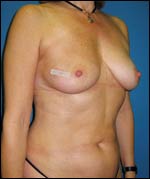Project AesCert Guidance, a multi-disciplinary set of principles developed to provide aesthetic practitioners with practical strategies to safeguard the health and welfare of patients, providers and the community-at-large as they re-open their offices during the SARS-CoV-2 (Coronavirus) pandemic, was published recently via the American Academy of Facial Plastic and Reconstructive Surgery’s (AAFPRS) official peer-reviewed medical journal, Facial Plastic Surgery & Aesthetic Medicine.
The Guidance was organized and supported by the SkinBetter Science Institute and combines learnings from major hospital systems on the front lines of treating COVID-19 patients, prestigious academic research institutions studying the underlying SARS-CoV-2 virus on a global basis, and leadership of the Facial Plastic Surgery, Dermatology and Plastic Surgery specialties who understand what it means to implement elevated safety measures within the reality of a busy aesthetic office.
“Our AAFPRS members, and other practitioners in facial aesthetics, are engaged in procedures of the face, head, and neck which carry a higher risk of exposure to a highly contagious transmissible disease such as the SARS-CoV-2 virus, which is spread through direct contact as well as through aerosolized particles that can arise from a sneeze or cough,” observes Dr. Mary Lynn Moran, AAFPRS President and a member of the Project AesCert Guidance Editorial Board representing the Specialty of Facial Plastic Surgery, in a media release from AAFPRS.
As stay-at-home orders are being lifted and businesses and medical practices are allowed to re-open, preventative measures are critical for protection of both the community, as well as medical providers. “Experts are working at breakneck speed to learn as much as possible about the nature of this new virus to which we have no immunity—but until treatments and vaccines are developed, our only defense is prudent prevention,” Moran cautions.
“We are grateful that the Project AesCert Guidance was published in Facial Plastic Surgery & Aesthetic Medicine, and that Dr Moran was able to represent the specialty of Facial Plastic Surgery in creating this guidance. While many organizations have posted thoughtful recommendations about how aesthetic practices and their patients may begin to resume activity, we felt the expertise of national experts in SARS-CoV-2 and COVID-19, combined with leading authorities in aesthetic medicine, across multiple specialties would create a unique and authoritative resource,” Jonah Shacknai, Executive Chairman of the Skinbetter Science Institute, comments in the release.
“We wanted to ensure that there was specific guidance by treatment type, applicable across aesthetic medicine specialties, to help practices across the country implement safety procedures.”
The AesCert Guidance was crafted by multi-specialty experts by taking well-established practices in light of what we currently know about the nature and behavior of SARS-CoV-2 and applying them to all aspects of the patient interaction.
“The AAFPRS is endorsing the Project AesCert Guidance as being a set of practical and sensible protocols for physicians to consider implementing in an effort to attempt to minimize COVID-19 transmission during non-surgical aesthetic procedures,” Moran reports. “Application of such guidance should be exercised in light of federal, state and local directives related to COVID-19 conditions where the practice is located—in conjunction with prudent and ethical medical judgement regarding the unique nature of each patient’s clinical, social and environmental conditions, within the distinct circumstances of each practice setting.”
The reopening of aesthetic medical practices should be considered only if local and state regulations allow for the resumption of those activities, in light of local rates of infection and the availability of validated testing. Additionally, adequate supplies of PPE (personal protective equipment) and disinfection supplies effective against SARS-CoV-2 must also be available first to the community in order to care for current and potential cases of COVID-19 infection. If these requirements are met, then the availability of PPE to the practice must be ensured in order to consider resumption of safe practice.
“Members of the AAPFRS are highly trained and skilled physicians, always focused on patient safety above all else, and the Project AesCert Guidance will be an invaluable tool to assist our practitioners and all in aesthetic medicine with safely re-opening practices,” Moran affirms. “The Skinbetter Science Institute’s timely and charitable efforts to assemble a multidisciplinary group of aesthetic medicine experts to create this resource is deeply appreciated, as the Project AesCert Guidance provides essential protocols for consideration in order to resume aesthetic treatments in the safest way possible.”
[Source(s): AAFPRS, PR Newswire]



